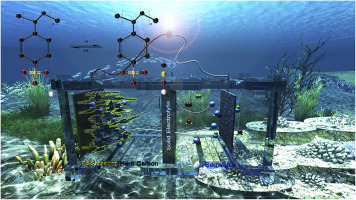Redox chemistry of advanced functional material for low-cost and environment-friendly seawater energy storage
- Journal
- Materials Today Energy
- Vol
- 21
- Page
- 100805
- Year
- 2021
Although rechargeable seawater batteries are promising energy storage systems, their electrochemical performance is inferior to that of lithium batteries; moreover, opportunities for improving their performance are restricted by the limited range of available anode materials to complement seawater cathodes. Organic redox materials can help overcome the drawbacks associated with seawater batteries because of their inherent fast charge transfer capability. Therefore, in this study, we design a unique hybrid seawater battery in which poly (4-styrenesulfonate) as a sodium-ion storage polymer is functionalized with hard carbon (HC) to form a functional anode with high capacity by in situ polymerization. Sodium-ion storage mechanisms of the poly (4-styrenesulfonate) (PSS) and HC-PSS functional material are investigated through electron spin resonance, solid nuclear magnetic resonance, X-ray photoelectron spectroscopy, and molecular orbital studies. Each HC and PSS in the HC-PSS electrode clearly contribute to reversible electrochemical reactions. This polymer is observed to prevent the growth of a solid electrolyte interface on the surface of the functionalized HC-PSS anode, and the seawater battery exhibits excellent electrochemical properties, making it suitable for high-performance eco-friendly energy storage systems.

